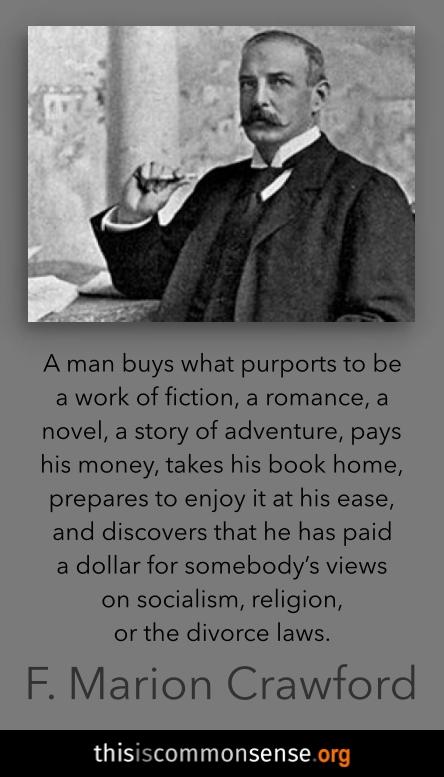Every man should be considered as having a right to the character which he deserves; that is, to be spoken of according to his actions.
James Mill


Every man should be considered as having a right to the character which he deserves; that is, to be spoken of according to his actions.

So far as supply and demand are concerned, books in general and works of fiction in particular are commodities and subject to the same laws, statutory and traditional, as other articles of manufacture. A toy-dealer would not venture to sell real pistols to little boys as pop-guns, and a gun-maker who should try to sell the latter for army revolvers would get into trouble, even though he were able to prove that the toy was as expensive to manufacture as the real article, or more so, silver-mounted, chiselled, and lying in a Russia-leather case. I am not sure that the law might not support the purchaser in an action for damages if he discovered at a critical moment that his revolver was a plaything. It seems to me that there is a similar case in the matter of novels. A man buys what purports to be a work of fiction, a romance, a novel, a story of adventure, pays his money, takes his book home, prepares to enjoy it at his ease, and discovers that he has paid a dollar for somebody’s views on socialism, religion, or the divorce laws.
Francis Marion Crawford, The Novel: What It Is (1893).

It’s “mobocracy” — the riots in major cities around the nation, but especially in Portland, Oregon, where the president sent federal agents. Local police had stood back for weeks as Democratic politicians — such as Joe Biden — referred to the rioters as “peaceful protesters.” Even as the mobs lit fires in the streets, defaced property, and attempted to break into government buildings.
Buck Sexton, writing at The Hill, makes the obvious linkage between the “anarchists” and the “Democratic” Party.
But Sexton doesn’t really answer the key questions: “Why are anarchists terrorizing Portland? What was the real purpose of the Seattle ‘Capital Hill Autonomous Zone’? Why were ‘Occupy City Hall’ protesters allowed to fight with police in lower Manhattan for a month, until officers cleared out their encampment on Wednesday?” Sexton rejects the official reasons give by the movements’ apparent leaders, but doesn’t go very far beyond Democratic Party attempts to leverage the riots.
Which may at least offer amusement. “The reason I am here tonight is to stand with you,” Portland Mayor Ted Wheeler assured the mob as he put on goggles. “So if they’re launching the tear gas against you, they’re launching the tear gas against me.” But that same night, his security detail “scuffled” with “protesters” and his own police department threatened to use tear gas and impact weapons on the incendiary horde.
Is this really about legitimate protest, as Biden insists?
Fighting federal fascism, as Democrats and many others insist?
Americans are all-in for criminal justice reform and the right to protest. Many, me included, have peacefully taken to the streets in recent weeks.
But there is nothing peaceful about assault, arson, property destruction.
And Democrats who aim to use the fracas to beat Trump in November may find that ‘playing with fire’ … burns.
This is Common Sense. I’m Paul Jacob.
—
See all recent commentary
(simplified and organized)

… and to the refrigerator for which it stands, one cooling unit, under electric power, indivisible from the side by side freezer, with cold drinks and frozen TV dinners for all.
Silly to pledge allegiance to a refrigerator or its warranty? Perhaps no more so than to pledge allegiance to our nation’s flag or our beloved Republic, for which that flag stands.
Wait a second: Doesn’t our Republic deserve our allegiance?
Well, what is meant by “allegiance”? The first dictionary definition reads: “the obligation of a feudal vassal to his liege lord.”
The word “allegiance” does indeed derive from feudal times. Even further variations of the definition — “the fidelity owed by a subject or citizen to a sovereign or government” or “the obligation of an alien to the government under which the alien resides” — are tied to a relationship whereby “We, the People” are inferior to our nation-state.
But not in America. We are not “subjects” nor “aliens.” We are the sovereigns.
That wonderful frost-free icebox is ours; it works for us. This Republic is also ours and it was designed to work for us. In clear and deliberate language. In fact, language not dissimilar from an appliance warranty — though written more accessibly for the common person.
We are the government. So, do we really need to pledge our allegiance to ourselves?
As Judge Andrew Napolitano asked on his Freedom Watch show several years ago — before Fox mysteriously cancelled the show — “Does the government work for us or do we work for the government? Are true patriots guided by symbolism such as flag waving and pledges or by their commitment to personal freedoms?”
Perhaps it doesn’t matter. Most folks reciting the Pledge surely do not view themselves as feudal serfs.
Still, words matter. And actions and rituals matter as well. Tomorrow we celebrate Independence Day — not simply as a method to get out of work, but as a way to remind ourselves and our children that this country was conceived in liberty, in the hope we can continue to expand on and live in freedom. (That’s why I say “Independence Day” rather than the “Fourth of July,” since what happened is much more important than the date it happened.)
The Founders who signed the Declaration of Independence — pledging their lives, fortunes and sacred honor — didn’t see fit to establish a pledge for citizens to recite. Their pledge was to each other and to the country.
The Pledge of Allegiance, on the other hand, was written by an admitted socialist, Francis Bellamy, in 1892. In addition to the Pledge, Mr. Bellamy also came up with a salute for school children and others to make toward the flag. To prove that truth is stranger than fiction, what came to be known as the Bellamy Salute was very similar to the salute adopted by Mussolini and the Italian fascists … as well as the Nazis, for use in tandem with their exclamation of “Heil Hitler!”
In 1942, after U.S. entry into World War II, Congress amended the Flag Code to advise folks to place their hand over their heart, instead of giving the Nazi — er, Bellamy Salute.
Don’t go off the deep-end here: I’m not suggesting that reciting the Pledge of Allegiance makes one a Nazi, or even a far milder brand of socialist. When Americans recite the Pledge, they do so for love of country and to affirm the freedoms our Republic is designed to protect and defend.
What I am declaring is that we Americans must understand our history, our government, and our exceptional place in the world well enough to stop defining patriotism as the repetition of someone else’s words about an alien concept of allegiance. Instead, let’s celebrate the words that are quintessentially ours: the Declaration of Independence, the Constitution and the Bill of Rights.
As we celebrate our Independence Day, our break from the monarchy of the Old World, we ought to appreciate that this break threw out any allegiance to rulers as if they wielded divine power over us and substituted for that corrupt rule a constitutional republic, where the citizens had protection against government encroachment on their freedoms, written down in black and white and fully enforceable.
The Constitution is a warranty of sorts. And the more we think of government in practical terms, like a refrigerator or an agreement for services, rather than some mystical force that tells us what to do, the better for actually maintaining our freedom and keeping our Republic.
As Tom Paine wrote: “It is the duty of the patriot to protect his country from his government.”
We cannot protect our freedom by repeatedly declaring allegiance to the Republic, much less its three-color stand-in.
Instead, saving our Republic requires citizens to stand up and demand that our government adhere to the contract.
This is Common Sense. I’m Paul Jacob.
—
See all recent commentary
(simplified and organized)

It’s been nine years since NASA launched astronauts into space, but the agency is scheduled to break that dry spell today.
This time it’s different, though, for the space agency has sub-contracted out the rocketry and launch control to SpaceX, Elon Musk’s aerospace company. “Only three countries have launched humans — Russia, the U.S. and China in that order — making SpaceX’s attempt all the more impressive,” NBC News reports.
Doug Hurley and Bob Behnken are the American astronauts slated to go into orbit in SpaceX’s Crew Dragon capsule sitting atop a Falcon 9 rocket. They are headed to the International Space Station, where only one American, Chris Cassidy, now works … and he got there courtesy of the Russians, launching rockets out of Kazakhstan.
The future of space travel depends on private enterprise, but moving from nation-state efforts has been slow. Even now, the relationship between NASA and SpaceX is … a big government/big business partnership.
Of which we have ample reason to be skeptical.
Elon Musk has been in the news, recently, even more so than usual. You have probably heard about he and his wife’s baby naming issue, or his “red pill moment” on Twitter.
And Musk’s true color probably is red, as in the Red Planet, Mars. He wants to get there.
He is not alone. India has an unmanned probe orbiting Mars right now, and, like China, has plans to get there as well.
Ever since astronomers Giovanni Virginio Schiaparelli and Percival Lowell claimed to have espied “canali” on the Red Planet, our imaginations have been on overdrive. From Edgar Rice Burroughs novels to obsessions about The Face, our thoughts have leaned to the alien.
Human exploration and colonization? Not alien at all.
This is Common Sense. I’m Paul Jacob.
—
See all recent commentary
(simplified and organized)

Time sure flies when you’re having fun.
Today is my birthday. I am 60, and thus begin my 61st year on this planet.
For the last four decades — my entire adult life — I’ve worked in politics. That might not seem like much fun. Politics is a constant struggle, a slog. But working for freedom — in one crusade or another — has been both fulfilling and fun.
Maybe it’s because, as a friend once accused, I’m a pathological optimist. Maybe it’s a whole lot more than that.
I’ve worked through nights, bleary-eyed, peering at voter registration lists. I’ve circulated petitions in 100-degree heat and freezing temperatures. I’ve been vilified in the press — oh, and lionized, too. I’ve been both hounded and praised. I’ve been imprisoned — and threatened with more of the same.
What was I thinking?
I guess I thought, and indeed still think, that we are called upon to do what we believe is right — come what may. Freedom isn’t free.

It’s been hard sometimes. I was in prison for five and a half months when my oldest was only a year old. I was there for refusing to register for the draft.
What was I thinking?
In the words of then-presidential candidate Ronald Reagan, I thought: “The draft or draft registration destroys the very values our society is committed to defending.” I could not stand idly by while those cherished values were destroyed, nor certainly be any party to it.
My re-education in federal custody fortunately didn’t take. And the road I took has made all the difference.
For instance, I met Ron Paul when, as a slightly younger congressman, he testified at my trial. Three years later, in 1988, I nominated him to run for president on the Libertarian Party ticket.
At a meeting in April of that year, the task of putting Congressman Paul on the ballot for president was handed to me. The next morning I was awakened by a phone call on the home line — at 6:00 am! And for the next six months the phone never stopped ringing.
I remember my wife calling me at the office to tell me our new home phone number — and urging me not to give it out to people! She’s a lot smarter than I am.
Working with wonderful people across the country, we successfully placed Ron on the ballot in 47 states and the District of Columbia. And Guam. Believe me, it took a lot of hours, daylight and late night.
What was I thinking?
I was thinking that given a choice, people would choose greater freedom, limited government and personal responsibility. We didn’t win, of course. But we weren’t through trying.
Howie Rich and Eric O’Keefe noticed my work on the petition drives and offered me a job running the Tax Accountability Amendment in Illinois. Half a million voters signed petitions to put the measure on the ballot. Then, at 77 percent in the polls, the Illinois Supreme Court took it off the ballot. (The same thing happened again four years later with a term limits petition.)
But, suddenly, freedom was breaking out around the world. The Berlin Wall came down. Czechs poured into the streets. Estonians were singing. We watched with inspiration and then horror as students rallied for weeks in Tiananmen Square only for the Butchers of Beijing to crush the peaceful protest with deadly force. The Chinese people’s dream was our dream; the desire for freedom — and the citizen control of government needed to preserve it — was universal.
The end of the Cold War allowed Americans to finally cast a full glance at city hall, at the state capitol, at Washington, D.C. We did not like what we saw.
Along came term limits.
In 1992, I was hired to run U.S. Term Limits. We were able to help activists in 14 states get on the ballot — the most states to ever vote on a single issue on a single day. All 14 states passed term limits, including my home state of Arkansas.
The issue continued to win at the ballot box in the states and in hundreds of cities and counties — from Wyoming to New York City. Politicians sued. Speaker of the House Tom Foley was one.
In 1994, Republicans swept to a majority in the U.S. House for the first time in 40 years, in no small part as a result of their embrace of term limitation. One of the biggest upsets was Foley, the only Speaker defeated for re-election since the Civil War, a victim of his own lawsuit to overturn his state’s voters.
And term limits — a case from Arkansas, not Foley’s — went to the Supreme Court. Unfortunately, in a narrow 5 to 4 decision, the court struck down Arkansas’s term limits law, and by implication laws enacted in 22 other states.
What was I thinking?
On the steps of the Supreme Court, I told reporters:
All over Washington today, the politicians and the power brokers are happy. You can hear the sound of champagne corks popping. I have a simple message to them. Drink up; you’re outnumbered.
Term limits went nowhere in Congress, of course. There were a few principled supporters, but most wanted a career of perks and power. It’s very seductive.
I was on the wrong side of an 80/20 issue. I was with the 80 percent of Americans for term limits.
What an amazing situation: Our representatives refuse to do what 80 percent of the people want. In essence, they refuse to give back the power we’ve loaned to them.
The issue won’t go away. A decade ago, if you went to a Tea Party event, you would see the homemade two-word signs: Term Limits! And then-President Barack Obama insisted on the importance of term limits for Congress and for executives in foreign countries, and he regarded it as a matter of course: it’s tyranny without them.
Now, a very different president, Donald Trump, has repeated the importance of legislative term limits. It was one reason many people voted for him. And best for republican governance.
Though, a lot of people in power sure pretend to think the opposite.

The battle has not been lost or abandoned. I still sit on the board of directors of U.S. Term Limits and help out where I can in a very aggressive national campaign to bypass Congress by garnering 34 states to call a convention (under Article V of the Constitution) to propose a constitutional amendment for ratification by the states.
Frankly, the only negative result of term limits sweeping those states with initiative and referendum has been the backlash. Legislators and their favored special interests have launched concerted attacks on the initiative process for enabling the people to do such a thing in the first place.
What was I thinking?
The initiative process is the most effective protection we citizens have from government gone wild.
Regular readers of Common Sense know my more recent work in helping citizens across the country petition to put initiatives on the ballot to protect homes and small businesses from being taken through eminent domain abuse, enact state spending limits, defeat ever-increasing gas taxes, protect citizen-only voting and enact criminal justice reform in places like Ferguson, Missouri.
A decade ago, in the spirit of “no good deed goes unpunished” and in the cesspool that has become our politics, Oklahoma Attorney General Drew Edmondson indicted three of us, The Oklahoma Three, for “conspiracy to defraud the state” over a 2006 initiative there.
What was I thinking?
The Oklahoma powers-that-be were scared. And they did not want us taking a limit on government spending to a public vote.
And perhaps, for a moment or two, I may have thought “I’m getting too old for this.”
We were innocent of the charge and we fought back. After more than a year and a half with a possible ten-year prison term hanging over our heads, the charges were dismissed. The AG had campaigned in the press that we were guilty, but he had repeatedly blocked our case from going before a judge for a preliminary hearing to determine if there was enough evidence to even go to a trial.
No such hearing was ever completed. Meanwhile, the state’s petition law was struck down as unconstitutional in federal court.
The AG thought he could threaten us into submission. He had offered my co-defendant Susan Johnson a deal: plead guilty and all she’d get would be a small slap on the wrist.
Like so many unsung patriots in this country, she told him to stuff it.
What was she thinking?
All that is necessary for the triumph of good is for the majority of people — who are indeed good at heart — to stand up and be counted. The people are not the problem. They are the solution to the problem.
When government becomes Goliath, the initiative is the people’s slingshot.
In my recent travels around the world in support of freedom-centered democracy — citizen-controlled government — I’ve encountered truly courageous people in Hong Kong, Taiwan, and elsewhere. Everywhere the message is becoming clearer, at least to folks like you, advancing the cause.
Times are strange. Even scary. But I’ve never had more hope for the future. Together, I’m convinced we can leave our kids and grandkids an insurance policy. Not one that pays out money when we’re gone, but something they’ll need even more:
Freedom.
The key to restoring and protecting freedom? Give the intrinsic decency and the common sense of the American people a chance to prevail.
That’s what the initiative and referendum process is all about: an opportunity to place some measure of common sense on the public agenda, and when needed, to check the power of the high and mighty.
As I look back on my five decades, I’m thinking how proud and how lucky I am to serve as president of Citizens in Charge and Citizens in Charge Foundation, the only national organizations committed to protecting the right of citizens to initiative and referendum, and to lead the Liberty Initiative Fund, an organization that helps liberty-minded people advance ballot measures that expand liberty and constrain government.
Many times through the years I’ve asked you to make a sacrifice to support our mutual cause. Your generosity has made the difference. Again today, I ask for your help.
Please support this online voice.
For 20 years, this daily Common Sense commentary hasn’t skipped a weekday, and now our brand spanking new, This Week in Common Sense video/audio podcast is also at thisiscommonsense.com. This has been the hub of my political activism since 1999. Here I keep the lines of communication open with freedom-minded folk everywhere, and when I notice an opportunity, from where I explain how we can best advance our cause.
But a website and daily commentary — and now a weekly podcast — take not only time, but money. To keep it going, and even expand our reach on social media, your help now would be just that: Help. Now. For the future.
Don’t donate $60 to This Is Common Sense just because I’m turning 60. If that were the only motivation, I’d want you to give $59 or $33 or $21. I’d feel younger.
Give whatever you can afford — $60 or $6 or $600 — because your liberty and mine, as well as freedom for our loved ones, is worth every penny.
And right now I can help increase the bang of your bucks. A generous donor has promised to match, dollar for dollar, your donation — up to $15,000. So whether your donation is a 6 followed by one zero, two, or three, you’ll know that the effect will be doubled.
What a deal!
I urge you to not put this aside. No matter what you contribute, please do it right now. After all, we’re not getting any younger.
As a lover of freedom and not omnipotent government, you are already way ahead of the crowd! What are you thinking?
I hope you’re thinking that you will join me by supporting Common Sense, to restore liberty, to put freedom first.
This is Common Sense. And I’m seventh-decade-advancing* Paul Jacob.

P.S. When you make a financial gift, your spouse, your friends, your neighbors and co-workers may ask you: What were you thinking?
So tell them. Freedom needs not only your support, but theirs.
* If my seventh-decade (!) reality inspires you to increase your donation from $60 to $70 — or from $600 to $700 — the whole idea of moving forward would add just an extra bit of pizazz.

—
See all recent commentary
(simplified and organized)